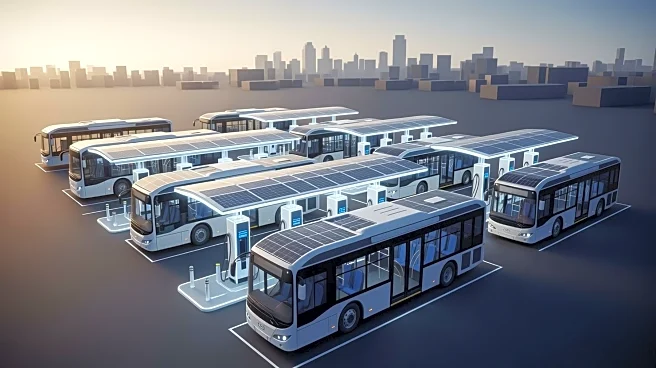What's Happening?
Miejskie Zakłady Autobusowe (MZA) in Warsaw has placed an order for 50 articulated electric buses from Solaris Bus & Coach. This marks the second recent procurement of electric vehicles by the Polish public
transport operator, following a previous order for 79 Solaris battery buses. The new buses, scheduled for delivery in the second half of 2026, are part of Warsaw's ongoing efforts to reduce emissions from public transport. The Solaris Urbino 18 electric buses feature modular drive systems and batteries with a capacity exceeding 700kWh, charged via a plug-in connector. The design maximizes passenger space by eliminating the traditional engine tower, with all batteries mounted on the roof. This partnership between Solaris and MZA Warsaw, which began in 1997, has resulted in the delivery of 1,350 buses, including 163 electric units. Upon completion of the latest orders, nearly 300 zero-emission Solaris Urbino electric buses will be operational in Warsaw.
Why It's Important?
The expansion of Warsaw's electric bus fleet is a significant step towards reducing urban emissions and promoting sustainable public transportation. By increasing the number of zero-emission vehicles, Warsaw is addressing environmental concerns and contributing to cleaner air quality in the city. This move aligns with broader global trends towards electrification in public transport, which can lead to reduced reliance on fossil fuels and lower greenhouse gas emissions. The partnership with Solaris also highlights the importance of collaboration between local governments and manufacturers in achieving sustainability goals. As cities worldwide grapple with climate change and pollution, Warsaw's initiative serves as a model for integrating advanced technology into public infrastructure.
What's Next?
The delivery of the new buses is expected to occur in the latter half of 2026, which will further enhance Warsaw's public transport capabilities. As the city continues to expand its electric fleet, it may explore additional partnerships or technologies to further reduce emissions. The success of this initiative could encourage other cities to adopt similar strategies, potentially leading to increased demand for electric buses globally. Stakeholders, including environmental groups and public transport advocates, will likely monitor the impact of these buses on urban air quality and public health. Additionally, the ongoing collaboration between Solaris and MZA Warsaw may lead to future innovations in electric vehicle design and efficiency.
Beyond the Headlines
The shift towards electric buses in Warsaw reflects broader cultural and ethical considerations regarding environmental responsibility and sustainable urban planning. As cities face increasing pressure to address climate change, the adoption of electric vehicles represents a commitment to future generations and the planet. This transition also raises questions about the infrastructure needed to support electric fleets, such as charging stations and maintenance facilities. Furthermore, the move may influence public perception of electric vehicles, potentially increasing acceptance and demand for similar technologies in personal transportation.









